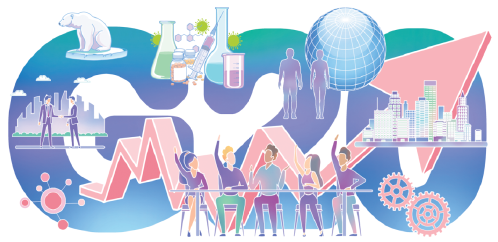
JIN JING/CHINA DAILY
China and Italy are deepening their bilateral relations in the new era to promote peaceful development
Leaders of G20 countries and international organizations gathered in Rome last month for their summit to discuss topics of global concern such as the fight against the COVID-19 pandemic, the global post-pandemic economic recovery and climate change. Delivering a speech via video link at the summit, President Xi Jinping conveyed China's ideas to deal with these pressing challenges, demonstrating China's role as a responsible country and its commitment to practicing multilateralism with other countries.
China has stood in solidarity with the rest of the world in the fight against the pandemic. President Xi proposed a Global Vaccine Cooperation Action Initiative at the summit, and called for the international community to promote the fair distribution of COVID-19 vaccines. China will provide over 2 billion doses of such vaccines to other countries and international organizations by the end of this year.
While making all-out efforts to contain the virus at home, China has also extended a helping hand to countries in need by donating vaccines, carrying out joint vaccine production with 16 countries, and providing protective medical materials.
China has also delivered on its promises to mitigate climate change. In 2020, China's carbon emissions per unit of GDP dropped by 48.4 percent from the 2005 level, beating its pledged target. One-third of the country's electricity is generated by renewable energy. It leads the world in new installed capacity of photovoltaic power generation and has pledged to stop funding coal-fired power plants overseas. As a country still in the later phase of industrialization, China pledges to peak carbon emissions before 2030 and achieve carbon neutrality before 2060, ambitious targets for a developing country.
To this end, the country is moving fast to put in place a"1+N" policy framework, where"1" stands for the guiding principle and top-level design for peaking carbon emissions and achieving carbon neutrality, and "N" refers to the various implementation plans for key areas and industries.
Facing the global economic challenge, China calls for making global development more equitable, effective and inclusive. President Xi proposed a Global Development Initiative at the UN General Assembly in October and he further expounded on the people-centered philosophy of the initiative at the G20 summit.
While seeking its own development, China is willing to share the benefits of its development with other countries. Faced with a complex and volatile global economic landscape, President Xi proposed holding an international forum on resilient and stable industrial and supply chains that he encouraged G20 members and international organizations to participate in. China also welcomes the International Monetary Fund's decision on the new allocation of Special Drawing Rights totaling $650 billion, and stands ready to lend the new allocation to low-income countries that are seriously affected by the pandemic.
As a Chinese saying goes, a single tree does not make a forest. The G20 Rome summit, hosted by the Italian G20 presidency, with its theme of "People, Planet and Prosperity", focused on addressing humanity's common challenges in solidarity, which is in line with China's philosophy of promoting high-quality development and building a community with a shared future for mankind. As Italian Prime Minister Mario Draghi emphasized at the summit, multilateralism is the only possible answer to the problems we face today, and going it alone is not an option to tackle the challenges.
China and Italy are comprehensive strategic partners. It is in the fundamental interests of the two peoples and the rest of the world for the two nations to deepen bilateral relations, practice true multilateralism and promote peaceful development. To stick to multilateralism, the two countries should make efforts in several aspects.
First, the two countries should uphold mutual respect. They should seek the greatest common denominator, cherish their traditional friendship, and respect each other's development paths chosen by their own people.
Second, the two countries should uphold opening-up and mutual benefit. In the first 10 months of this year, trade between the two countries increased by 37 percent year-on-year. China is willing to expand its imports of quality products from Italy and wishes Italy to provide an open, fair and nondiscriminatory business environment for Chinese enterprises. The two countries should also jointly promote cooperation within the framework of the Belt and Road Initiative to benefit the two peoples.
Third, the two countries should uphold mutual support. It is imperative that China and Italy solidify mutual trust and collaboration and respect each other's core interests. China and Italy are hosts of the Winter Olympic Games in 2022 and 2026 respectively. The two nations should support each other and seize the opportunity of hosting the Games to carry out more people-to-people exchanges.
Fourth, the two countries should uphold multilateral cooperation. They should play more constructive roles in international affairs by strengthening coordination and communication under multilateral frameworks. They should safeguard the international system with the United Nations as its core, promote the democratization of international relations and reform of the global governance system.
The trip ahead may be long and arduous. We must press ahead with a sense of urgency and perseverance to achieve our goals. China and Italy, both heirs to great ancient civilizations, will certainly join hands in the new era and illuminate the future of humanity by holding high the torch of multilateralism.
( LI JunHua, China's ambassador to Italy. The author contributed this article to China Watch, a think tank powered by China Daily.The views do not necessarily reflect those of platform.)






